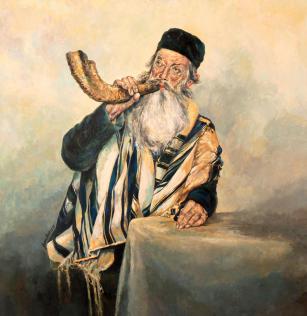Every week, parshaoftheweek.com brings you a rich selection of material on parshat hashavua, the weekly portion traditionally read in synagogues all over the world. Using both classic and contemporary material, we take a look at these portions in a fresh way, relating them to both ancient Jewish concerns as well as cutting-edge modern issues and topics. We also bring you material on the Jewish holidays, as well as insights into life cycle rituals and events...
Central to the Rosh Hashanah experience is, of course, the sounding of the shofar. The tradition is to get a head start, and blow the ram's horn every morning during the month of Elul, leading up to the 100 blasts we sound on each of the two days of the holiday itself. Interestingly, this seminal mitzvah, which is the climax of our rituals for the New Year and the Days of Awe, is actually something of a mystery. The Torah is extraordinarily stingy with information about it: "In the seventh month, on the first day, you shall have a Sabbath, a commemoration of the sounding a blast, a holy day. (Va'yikra, 23,24)" No information about how exactly one is meant to sound this blast, with what instrument, what the blast is supposed to sound like, and why we should, in fact, sound a teruah on this day at all.
The Rabbis, in the Talmud, derive the meaning of the word teruah in the following way. They look ahead in the Bible, to the Book of Judges, to the story of the battle fought by Barak, the Israelite commander-in-chief, and Devorah, the prophetess, against Sisrah, the Canaanite general. After defeating Sisrah, Devorah sings a victory song (Judges, chapter 5), in which she describes Sisrah's mother crying at her window, awaiting his return. We know he will not be coming back, as, after he fled, defeated, from the battlefield, he was killed by the Jewish housewife/heroine, Yael. The Rabbis notice that the word Devorah uses to describe the crying of Sisrah's mother is יבבה (yebava), and that this word is the same as the Aramaic translation of teruah in the verse in Va'yikra about Rosh Hashanah. Eureka! We now know what a teruah is supposed to sound like: it's a yebava, so it must sound like the crying of Sisrah's mother, which Devorah calls a yebava as well.
The Rabbis then discuss what this kind of crying must have sounded like, and come up with three options: moaning, sobbing, or moaning and sobbing together. So, today, as our teruah, to be sure to cover all the possibilities, we blow a moaning sound, called the שברים (shevarim), a sobbing sound, called the teruah, and the two together - shevarim-teruah. These are preceded and followed by a long, simple, uninflected blast, called the תקיעה (tekiah), which can be understood as a kind of counterpoint to the crying, moaning sound of the teruah - like an "all clear", or “take a deep breath”, perhaps.
The remarkable fact that the Rabbis, in trying to understand the message of the shofar, turn to a non-Jewish mother of an enemy of the Jewish people, and use her emotional response to his death as the source for our emotional response to the Day of Judgment, goes to the very core of what this Day of Judgment is all about. As Sisrah's mother responded with tears to the possibility of the loss of her son, so, too, we are meant to hear in the shofar blast the appropriate response to being judged by the Creator of the Universe. The shofar is meant to express for us, and to us, the existential dread we should be feeling on this day, as we look inward at our lives, our actions, at the world we have made, and at its, and our, shortcomings. The fact that the sound used to express this is modeled by Sisrah's mother teaches us the basic human and universal nature of this emotion. We are not meant to respond to the possibility of being judged and found wanting with words, or even with a sound that is recognizably Jewish. We are meant to respond on the most elemental level we know, the most basically human, to the awful possibilities of this day, as a mother responds to the possibility of the death of her son, the death of her hopes and dreams. We are meant to cry, as any person would, as Sisrah's mother did, when faced with an insurmountable emotional challenge, an existential failure, an irredeemable loss.
On Rosh Hashanah we say a lot of words. As Jews, we seem to always be saying a lot of words. We pray, we sing, we recite, we bless, Rabbis speak. At the center of the Rosh Hashanah experience, however, we are asked to put the specifics, explanations, and complications of words aside, to forget the culturally-dictated, over-intellectualized way in which we usually think about things, to forget, even, any specifically Jewish way we might respond to this Day of Judgment. We are asked to respond in the most basic, human, universal way we can, and in that way, empty of explanation, rationalization, and excuse, without words, sound and hear the shofar blast, and face the truth of who we are and what we have done, or have failed to do.
Shana Tova u'metukah,
Rabbi Shimon Felix



Get inspired by Rosh ha-Shanah Divrei Torah from previous years